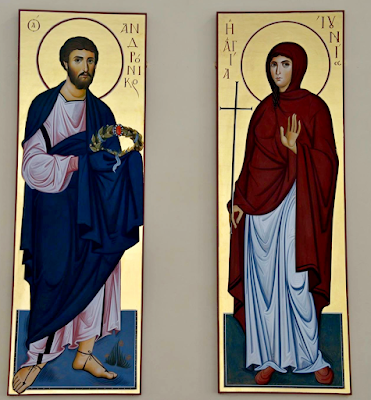Ιουνία (Iounias) is a feminine name in Greek, and this is widely accepted by scholars and linguists. The Greek grammar and syntax used in Romans 16:7 clearly indicate that Junia was a woman. This challenges the notion that apostleship was reserved exclusively for men, and opens the possibility of women serving as apostles in the early Christian community.
Many New Testament scholars have argued that Junia was a female apostle based on the Greek text of Romans 16:7. The phrase “ἐπίσημοι ἐν τοῖς ἀποστόλοις” (“episēmoi en tois apostolois”) used to describe Junia can be translated as “prominent, (or outstanding) among the apostles." This suggests that this indicates Junia held a high and respected position among the apostles, implying that she was a legitimate apostle recognized by Paul and the early Christian community.
"Among Apostles" Vs. "Known to Apostles"
Scholars argue that Junia was described as "outstanding among the apostles," which includes her among the apostolic body. However, others suggest that Junia was "well known to the apostles," which would exclude her from being an apostle. This exclusive reading is found in some translations like the ESV.
Supporters of the ESV translation argue that Junia was a woman who was well known to the apostles, but not an apostle herself. Critics of this view argue that grammatical constructions and historical context support an inclusive reading that Junia was an apostle. They also cite other biblical passages and early Christian interpretations to support an inclusive interpretation of Junia as an apostle.
Beth Allison Barr discusses the Junia dispute in her book The Making of Biblical Womanhood: How the Subjugation of Women Became Gospel Truth (2021), quoting Beverly Roberts Gaventa and concluding that "Junia became Junias because modern Christians assumed that only a man could be an apostle."
Junia and Joanna
Richard Bauckham, in his book, Gospel Women: Studies of the Named Women in the Gospels (2016), argues that Junia could be identified with Joanna, the wife of Chuza mentioned in Luke 8:3. Bauckham suggests that "Joanna" could have been her Jewish name, while "Junia" was her Roman name. He points out that Joanna is mentioned as one of the women who traveled with Jesus and his disciples, supporting them out of her own means, and as one of the women who witnessed Jesus' resurrection.
Bauckham further notes that Paul describes Junia as having been a member of the Christian community before him, indicating that she was part of the earliest followers of Jesus. He also highlights that Junia is described as "prominent among the apostles," suggesting her high status and influence within the early Christian community. Bauckham argues that Junia could be identified with Joanna due to similarities in their native language names, Joanna’s prominent position during Jesus' ministry, and other arguments which he articulates in detail.
I recommend reading the entire argument from his book, as it’s very thorough, and I’m only offering a summary. For even further study, the following traditional Christian scholars have also concluded that Junia was a legitimate female apostle: F.F. Bruce, Scott McKnight, Gordon D. Fee, Eldon Jay Epp, Linda Belleville, and N.T. Wright.
A Woman’s Name
Usually, the earlier we can get in history, and the closer to the original, the more accurate history we’ll find. This is the case with Junia’s name. Historical records show that until the 12th century, Junia was consistently interpreted as a female name, and it was not until the 13th century that an author claimed otherwise, altering the feminine name Junia to the masculine name Junias.
The first reference to Junia as a male comes from a medieval alteration of a passage by the Church Father Origen, who, centuries earlier, had described Junia as a female. It was during the medieval period that scribes began changing the name 'Junia' to the masculine version 'Junias' in biblical manuscripts due to prejudices against the possibility of a female apostle mentioned in the letters of Paul.
Other Women Leading
Junia was not the only woman mentioned in the New Testament who held leadership roles in the early Christian church. For example:
• Priscilla, along with her husband Aquila, is described as a coworker of Paul and is credited with instructing and mentoring Apollos (Acts 18:26).
• Phoebe is referred to as a “διάκονος” (diakonos) (Romans 16:1), which can be translated as “deacon,” “servant,” or “minister.” Paul described her as a helper of many, including himself. Many scholars have gone so far as to say the evidence points to Phoebe being the one who delivered the letter from Paul to the Romans, and would have been the person he commended to them to answer any questions about the letter. But that’s for another blog post!
• Mary is mentioned as someone who has worked hard for the church (Romans 16:6).
These examples demonstrate that women played vital roles in the leadership and ministry of the early Christian community, including that of teaching, mentoring, and serving.
In conclusion, Junia, as mentioned in Romans 16:7, was a female and a legitimate apostle in the early Christian church. Junia's story serves as a reminder of the vital role that women played in the early Christian community and the promise, "And afterward, I will pour out my Spirit on all people. Your sons and daughters will prophesy, your old men will dream dreams, your young men will see visions” (Joel 2:28, Acts 2:17-18).


.jpeg)

No comments:
Post a Comment